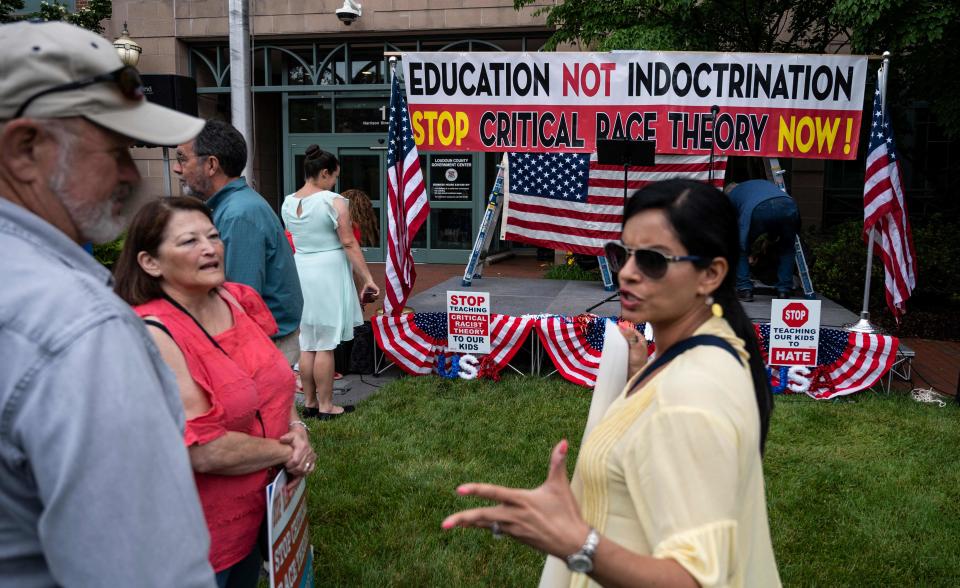Critical race theory: The narrative winning local elections for conservatives
When Washington state native Darwin Peters II ran for school board director in 2021, he was met with resistance from the start.
"My campaign was really attacked from the very beginning, which made it very, very difficult to effectively campaign," he said.
The 35-year-old father of six said his opponents transformed a nonpartisan election in Clover Park School District near Tacoma into a political horse race by invoking partisan rhetoric, such as opposition to critical race theory.
"I spent more time trying to combat that than I actually did getting the opportunity to really talk about my vision for our children and school board in our community," Peters said.
Conservative candidates for local office have successfully campaigned against critical race theory — a legal framework that considers structural prejudices against minorities in present day racial discrimination — since Republican lawmakers began leveraging it in 2021 to represent general dissatisfaction with school curricula.
Meanwhile, their progressive counterparts struggle to gain traction against the narrative that has enticed voters. And with a majority of states holding local elections this year, conservatives may make even more strides at that level.
Peters told USA TODAY his opponents used public antipathy against critical race theory to attack his campaign shortly after he filed his candidacy.
A supporter of an opposing candidate "basically started a campaign ... trying to brand me as a racist, trying to say that I am anti-police, anti-equality for all kids; that I was trying to push CRT and indoctrination on their kids and so on and so forth," he said.
Peters lost the election, coming in third behind his conservative counterpart by over 657 votes after an aggressive campaign and a dearth of voters in an off-year election. He said the experience convinced him not to run again for board director.
"I believe that it's important that those of us that really understand and have the ability to run, that we do," Peters said of ongoing conflicts on the board of directors. "And so I'm leaning more towards running again, if not for a school board position, possibly for some some another position that serves my community, specifically."

More: Why Virginia governor's tip line is sparking new critical race theory concerns in schools
Conservatives flock to critical race theory
President Donald Trump's September 2020 executive order banning "divisive concepts" from federal government training – encouraged by conservative activist Christopher Rufo – galvanized conservatives against critical race theory, which is rarely taught on the K-12 level, along with lesson plans such as The New York Times Magazine's "The 1619 Project," which argues Black Americans are the foundation of U.S. democracy, and similar frameworks.
"The term has expanded and has been appropriated by the right as a handy way to encapsulate all the trash that's being taught to our children in schools," said Matt Braynard, executive director of conservative-leaning policy nonprofit Look Ahead America, of "critical race theory."
A 2021 USA TODAY/Ipsos poll found that 60% of 2,000 parents surveyed want their children to learn about the ongoing effects of slavery and racism as part of their education, but just half support teaching critical race theory in schools. About 4 in 10 support restrictions on schools' ability to teach the framework.
Last year, candidates incorporating race in education or critical race theory in their platforms ran in 76 school districts across 22 states, according to nonpartisan elections website Ballotpedia. Conservatives had considerable successes in some parts of the country.
Four of six open school board seats in Pennsylvania's Central York School District, for instance, went to Republicans by thin margins, proving candidates can eke out a win by centering anti-racism initiatives in schools.
A Dallas-area Carroll Independent School District seat was won by an outspoken critic of a diversity plan launched after a TikTok video showing a group of white teens shouting racial slurs went viral. Conservative candidate Andrew Yeager beat his opponent by over 30 points. His victory came on the heels of two other conservative candidates, who also opposed the diversity plan.
And after witnessing the success of Republican gubernatorial candidate Glenn Youngkin's run on a platform opposing critical race theory, other conservative hopefuls for local office and school boards are projected to follow suit.
"CRT is a term that is a vehicle for all that (trash), and we're happy to use it because in communication, things need a handle and it is a good handle because people immediately understand what you're saying when you say CRT," said Look Ahead America's Braynard, who once served as Trump's campaign aide.
The strategy has already made a mark.
More: It's not just Virginia. Education and critical race theory are on the ballot across the US in 2022.
In January, a lawsuit was brought against the Albemarle County School Board in Virginia by Christian, conservative organization Alliance Defending Freedom that alleges the district's curricula teaches critical race theory. The group argues the theory “classifies all individuals into a racial group and identifies them as either perpetually privileged oppressors or perpetually victimized.”
In Florida, the "Individual Freedom" bill endorsed by Republican Gov. Ron DeSantis received its first approval in January. The bill prohibits public schools and private businesses from making white people feel uncomfortable while teaching students or training employees about discrimination.
And Youngkin signed an executive order ending the use of "divisive concepts, including Critical Race Theory" in public schools on his first day in office in January.
GOP strategists hope the strategy to fill local seats with anti-CRT conservatives will help the party in the congressional midterm elections in November – a plan progressive strategists are trying to deflect.
More: What happens when conservative school boards gain power at districts around the country
Pushing back on the narrative

Mina Davis, a two-time candidate for the Hutto Independent School District Board of Trustees near Austin, Texas, said that, while she lost the election, she narrowly avoided the "madness" of critical race theory during her 2021 campaign.
"I was very fortunate. I escaped it. I feel bad for everybody that came after," said the 29-year-old community organizer.
Davis said she felt she lost her bid for a seat on the board in part because she openly ran as a Democrat. But she noted critical race theory is already showing up in campaign literature for the 2022 elections.
"They need to not sleep on that," Davis said of Hutto ISD voters. "If it's on campaign literature, it's part of the lexicon. It's part of it."
"Friends of mine who are in the polling space say that, unfortunately for some of us who want to be done with that discussion, (critical race theory) still polls well depending on how you ask a question," Davis added. "And that is the scary part."
Republicans succeeded in building a narrative that drove voters to the polls, according to Ross Morales Rocketto, co-founder and co-director of progressive campaign organization Run for Something.
"It's really difficult to untangle critical race theory from like, mask mandates and vaccine mandates, from the attacks on social emotional learning and Parents' Bill of Rights, and all that stuff," he said. "They're all different sides of sort of like the same insidious coin. And they're targeted at different groups of voters."
The rise of CRT: How critical race theory went from conservative battle cry to mainstream powder keg
Dominating local elections is a goal the GOP has been working toward consistently, according to Run for Something co-founder Amanda Litman.
“Republicans are extremely ahead. Part of the reason is that they’ve been doing this for decades," she said.
Rocketto credits a renowned Republican strategist for the GOP's ability to rally conservative voters and get them to the polls.
"In the late 1970s, Karl Rove basically wrote a 40-year plan for a permanent Republican majority," Rocketto said. "And Republicans are at year 38 to 40 of that plan. We Democrats are probably in year five of our own version of that plan."
Of 412 state or local candidates endorsed by Run for Something in 2021, fewer than half –167 – won their elections, including candidates running as incumbents and winning a second time.
Progressives fear a conservative wave
The consequences of conservative policy changes are already on display at local levels of government, according to Tory Gavito, co-founder and president of the progressive strategy organization Way to Win.
"I'm a mom in Texas ... I'm in a liberal city and with a liberal school board. And I can tell you, one of my daughters is in high school, and she's got a classroom monitor in her ethnic studies class who is watching the other teacher," Gavito said.
"You know, this is not the 1950s McCarthy era," she continued. "And so, when I think (of) and I hear stories like this from other moms across the across the state, it's like, how far back are we gonna let them push us? And that's what's really scary."
This year, 41 states and Washington, D.C., will hold school board elections, according to Ballotpedia. Twelve will take place in red states. Fifteen other states with races – Arizona, Colorado, Florida, Georgia, Indiana, Iowa, Michigan, Nevada, New Hampshire, New Mexico, Ohio, Pennsylvania, Virginia and Wisconsin – are neither red nor blue after the 2020 presidential election.
Municipal and local elections beyond school boards are slated for 31 states and Washington, D.C. Seats up for election include district attorneys, city council members, county commissioners and public administrators. Twenty-five of those 31 have introduced bills, rule changes or signed laws aimed at striking critical race theory and its ilk from school classrooms, according to Education Week.

Progressive candidates will have to withstand an enthusiastic conservative electorate and let go of entitlements pertaining to certain demographic groups, says Gavito.
"I think what Virginia taught us was, typically, you see some drop off in enthusiasm between presidential and a midterm cycle, or certainly off-year elections. The Republicans aren't seeing huge amounts of drop off. They're mobilized. They're getting pretty high numbers," Gavito said. "And so we have to recognize that the scale of campaigns that we're we're building, the scale of energy that we need to meet that right-wing enthusiasm, has to be equal to — if not greater than — a presidential (election), which is a lot of energy to stir."
Gavito also said Democratic candidates will have to work harder for the minority vote in 2022.
"There really is some truth to erosion of our base," she said. "Gone are the days when a Democrat can say, 'Oh, well, all I have to do is turnout the Latinos and (Asian-American and Pacific Islanders) and Black voters and they'll vote for me because it's just naturally in their interest to vote for Democrats."
Another challenge facing Democrats, says Litman, is gerrymandering — the practice of redrawing district lines to favor one party over the other or to suppress the vote in certain communities that differs from state to state. Experts say aggressive gerrymandering could give Republicans a U.S. House majority in 2022, after new state and congressional district maps take effect from redistricting following the 2020 Census.
Local candidates pushing opposition to critical race theory would then have a better chance at winning.
To combat gerrymandering, Democratic candidates will need to win by at least 60% and gain as much as an edge as possible, according to Litman. Her organization plans to run aggressive school board recruitment and support campaigns this year.
“There is no one way to be a Democrat running for school board," she said. "Republicans don’t have the same challenges.”
Contributing: The Associated Press
This article originally appeared on USA TODAY: Conservatives leverage CRT to seize momentum in 2022 local elections

